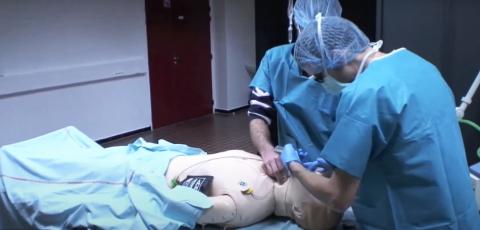
LabForSIMS: Simulation for training
LabForSIMS is one of the oldest and most active French centres for training via simulation. It was founded in 2012 with the support of the Kremlin-Bicêtre faculty of medicine (Université Paris-Saclay), and provides a venue for providing official training via simulation.
Before the LabForSIMS laboratory was founded, the anaesthesia team of Prof. Dan Benhamou at Bicêtre Hospital (AP-HP) had spent over twenty years providing continuous training for external anaesthesiologists. Now, training via simulation has broadened its scope and is available for medical students as well as nursing or physiotherapy students.
A varied training programme
The philosophy of training via simulation can be summed up in a few words: “never do anything for the first time on the patient.” In other words, it is all about giving medical personnel in training an opportunity to practise gestures or social aspects. An essential part of simulation is about improving the bedside manner of medical staff, preparing them for stressful, crisis or emotionally difficult situations. “The panel of activities is very broad, ranging from very simple technical gestures like inserting a drip to more complex training programmes, like teaching young doctors how to behave when they have to inform families that someone could not be revived after surgery,” explained Prof. Benhamou. This very broad catalogue of training courses is constantly developing as time goes on.
An expanding laboratory
Conventional simulation lessons need to be held in small groups of no more than 20 people. These small groups make it easier for participants to interact with each other and give everyone the opportunity to handle the tools and experience the subject for themselves, either by performing the relevant gestures or simulating a situation. It is, however, also one of the main obstacles for the activity, as it often proves difficult to provide this training to all students, owing to a lack of time. “The number of training programmes and trainers means that a very complex organisation is required if all the students in a given year are to benefit. To counteract this difficulty, we have increased the number of trainers and the number and size of our training rooms,” said Prof. Dan Benhamou. LabForSIMS is thus being extended and centres are being opened in multiple hospitals, with the long-term aim of creating a veritable network of simulation centres that covers the entire territory of Paris-Saclay. “We have opened a centre in Antoine-Béclère Hospital in Clamart and in the IFPM paramedical training institute of the CHSF hospital for the South of Île-de-France,” indicated Dan Benhamou. The LabForSIMS simulation centre’s overall educational consistency is being upheld throughout this process.
In search of innovation in education
LabForSIMS also favours game-based learning and offers ‘serious games’ as a way of approaching a topic. “The principle is simple: you play video games where you have fun, handle objects and re-enact medical situations. There is a storyline prepared in advance, including educational objectives. Students can play on their computer or their smartphone, which means they can follow the simulation without needing to go to the simulation centre. This makes learning easier”, explained Prof. Benhamou. The fun aspect makes training go more quickly, but it must be complemented by discussions with actual trainers, so that students can talk about what they have seen and learned, and ask any questions they may have.
In the end, simulation creates an entire educational model, which is why it is one of the innovative education methods being developed at Université Paris-Saclay. The University furthermore has an educational innovation department, in which LabForSIMS is a very active participant and nurtures links with the staff of the other components. The aim is to develop more and more innovative learning and teaching methods.
Training in technical gestures in the context of a pandemic
At the height of the Covid-19 crisis in France, the team of LabForSIMS urgently created a programme to train nurses and physiotherapists, both students and graduates, and medical students in gestures and technical knowledge to support intensive-care teams.
Assistance from volunteers was crucial when intensive-care services were overflowing. Specific training was required: "new staff had to be trained and be operational to go into the field the following day. Roughly 50 people were trained within a week," explains Professor Dan Benhamou, head of LabForSIMS. The laboratory trains healthcare professionals in techniques and how to handle crisis situations. "We can never be prepared for everything, but in this case, training using simulation was very useful. With more preparation, we will be even more effective!”

